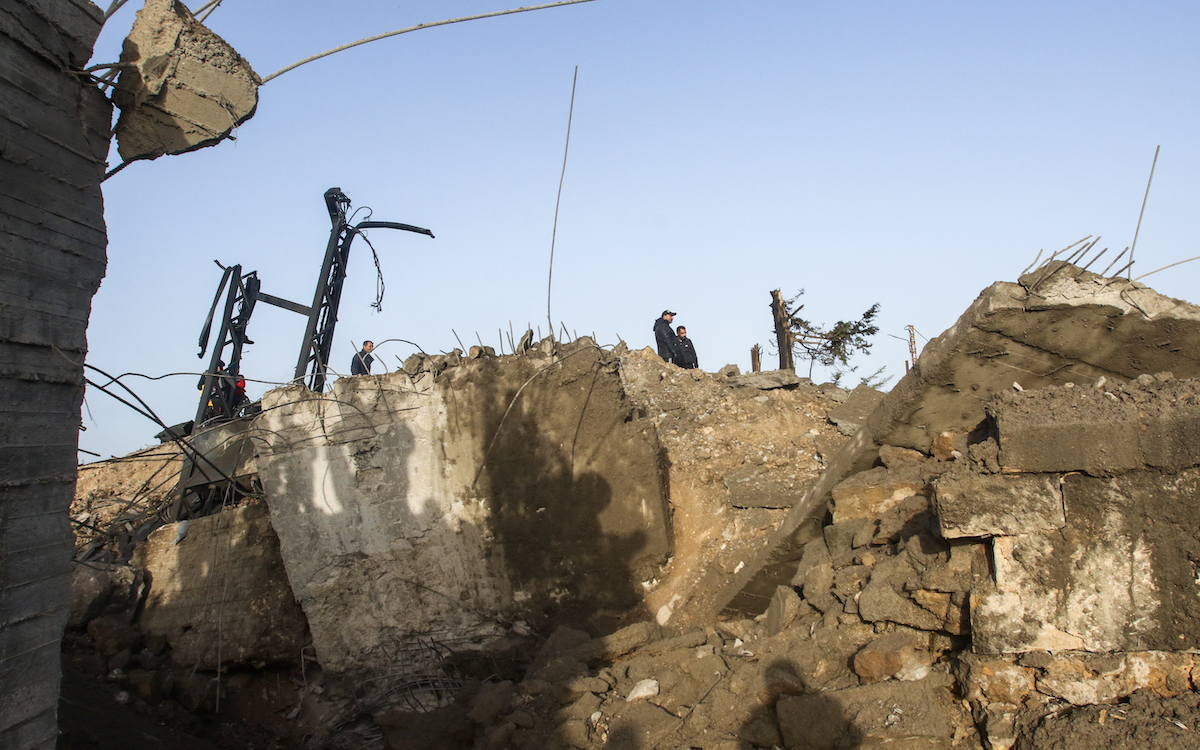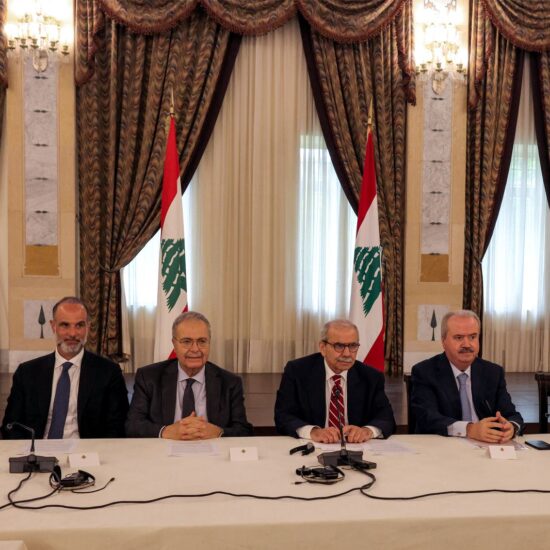
In the afternoon of April 6, an estimated 15 to 30 rockets were fired from south Lebanon into northern Israel, marking what is the most significant escalation in the conflict with Lebanon’s southern neighbor since Hezbollah and Israel fought a 33-day way in July 2006.
This time it was not Hezbollah who fired the rockets, but a Palestinian group responding to the recent Israeli aggressions on al-Aqsa in Jerusalem and its worshippers, most likely Hamas alone or with the help of Islamic Jihad, but the effect was the same.
After the rockets were fired, with around half of them intercepted by Israel’s Iron Dome defense system, the clock started ticking.
Everyone in Lebanon held their collective breaths waiting to see how Israel would respond to the rocket attack.
This was not a small attack like in August 2021, when a few rockets were fired by some rogue Palestinians, rather, it was the most significant attack in nearly two decades.
Hezbollah may not have fired the rockets themselves, but for such an operation to take place in their stronghold of south Lebanon, they definitely knew that it was going to happen and either actively or tacitly approved it.
So how would Israel respond, especially since the country now had the most extreme government in its history? Would it be a proportional response? Would they escalate? Would they flatten south Lebanon? Are we headed towards another war?
In fact, Israel was not sure how it would respond either.
During a meeting with his security council, Israeli Prime Minister Benjamin Netanyahu was presented with two options that carried two very different results.
The first was presented to him by the head of the Mossad, Israel’s external intelligence service, David Barnea, who argued that Israel should not only strike Hamas targets in Lebanon but Hezbollah as well since, according to him, Hezbollah would fire rockets back in the event of any Israeli response anyway.
The head of Israel’s military, Herzi Halevi, disputed this claim and proposed another plan in which Israel very carefully targeted Hamas targets and made it clear that they were only targeting Hamas and not looking for any sort of escalation.
Then, at around 4:30 am, Lebanon got its answer.
Halevi’s plan appeared to have won out. Israel fired six missiles into south Lebanon at the al-Rahsadiye refugee camp near the southern city of Tyre and Qleila where the initial rocket attack was believed to have come from. And that was it. No further response from Israel.
Everyone waited for what they assumed would be a response by Hezbollah, no matter how minor, with many still worrying about the possibility of war. But Hezbollah’s response is still yet to come.
Instead, morning came and caretaker Prime Minister Najib Mikati said that he would be filing a complaint at the United Nations over Israel’s missile attack, something that will have little to no impact, and things started to calm down a bit.
Over the weekend, a militia fired rockets from Syria into the Golan Heights and Israel also responded with a missile strike, but nothing more came from that.
The situation may have since calmed down, but tensions remain high with fears that it is only a matter of time before a third war in south Lebanon takes place.
In Lebanon
Hamas in Lebanon: Following the rocket attack from south Lebanon, Hamas political leader, Ismail Haniyeh, visited Lebanon with a small delegation where he met with Hezbollah Secretary-General Hassan Nasrallah.
It was reported that they discussed regional developments and the ongoing situation in Palestine. This meeting also came during heightened tensions with Israel and after militias in Syria fired rockets into Israel following the occupation’s infringements in Al Aqsa, prompting Israeli missile strikes in response.
In recent years, Hezbollah and Hamas have been strengthening their relationship with the recent rocket attack being a clear indicator of how good that relationship has become.
Haniyeh also met with other Palestinian leaders and forces in Lebanon.
Kheireddine in Paris: Lebanese banker Marwan Kheireddine is under formal investigation by French authorities for allegedly participating in a criminal association and aggravated money laundering.
Kheireddine was in France when the investigation was announced and while he was not detained, his passport was confiscated and he was told not to leave the country.
This is the latest move by French authorities in their probe into Central Bank Governor Riad Salameh and his alleged financial crimes.
Kheireddine unsuccessfully ran in Lebanon’s May 15, 2022 parliamentary elections on a list of Hezbollah candidates.
More sanctions: The United States announced that it was sanctioning Tony and Raymond Rahme for corruption, making them only the second Lebanese sanctioned by the US for corruption and not explicitly for being affiliated with Hezbollah.
According to the US, the Rahme brothers used their political connections to enrich themselves at the “detriment of the Lebanese people.” They are also accused of being behind the 2020 incident where tainted fuel was sold to Lebanon.
Both brothers are politically connected, with Tony often being linked to Lebanese Forces leader Samir Geagea and Raymond to Marada leader and presidential hopeful Sleiman Frangieh.
The sanctions will do little to combat corruption in Lebanon, a problem that has long been systemic.
In the region
Rising violence: On April 4 and 5, Israeli forces attacked worshipers at al-Aqsa compound in Jerusalem with over two dozen people injured in the ensuing clashes and an estimated 350 Palestinians detained.
According to the Israeli security forces, they were only there chasing Palestinian youth who had “barricaded” themselves in the mosque, a claim disputed by Palestinians.
The Israelis used disproportional force on the Palestinians trapped inside the mosque, with videos showing Israeli forces savagely beating worshippers.
In response to the Israeli incursions into al-Aqsa, Hamas fired missiles from Gaza which lead to Israeli airstrikes on the strip.
Then, two days later, two Israeli sisters were killed in a shooting in the occupied West Bank.
On April 10, Israeli settlers and government ministers marched towards an illegal settlement in the West Bank, another in a series of provocative moves likely to spark tensions and lead to further violence.
With already over 90 Palestinians killed so far, this year is on track to be the deadliest in recent years for Palestinians, a statistic recently given to 2022.
US to the rescue: The US sent attack submarines to the Middle East as tensions between Iran and Israel continue to rise.
This move by the US came as threats of Iranian drone attacks on Israeli-flagged vessels have become more prevalent and are believed to be planned retaliation by Iran for Israel’s killing of two IRGC officials in Syria.
It is not clear if the move by the US, which was uncharacteristically public, will serve as a serious deterrence for Iran.
Iran and Israel have been engaged in a shadow war for years, but it has become more direct in recent years.
The new power broker: Iran’s foreign minister Hossein Amirabdollahian and his Saudi counterpart, Faisal bin Farhan al-Saud, held a surprise meeting in Beijing on April 6, making this the highest-level meeting between Iran and Saudi Arabia in years.
This meeting also signaled that the announced rapprochement between the two would be here to stay, and that plans to reopen their embassies in their respective countries would continue as planned.
It also illustrated that China is continuing to enjoy its newfound role as the leading external power in the region as the US continues to be sidelined.
The extent of the rapprochement is unclear, but recent meetings between Saudi and Yemeni officials have raised hopes that the years-long conflict might soon come to an end.
What we’re reading
Press freedom: When Jean Kassir and Lara Bitar were called in for questioning by Lebanon’s security forces, it was a clear attack on freedom of the press in Lebanon. While the charges were eventually dropped, NOW’s Dana Hourany looked at the incident on press freedom in Lebanon.
A false narrative: Refugees in Lebanon have long been scapegoated by Lebanese officials looking to score some cheap and easy political points. NOW’s Robert McKelvey wrote about this rhetorical attack on refugees in Lebanon.
Revolution on canvas: The protests in Iran may have long subsided, but artists are continuing to tell its story. The Washington Post’s Miriam Berger wrote about the Iranian artists painting Iran’s uprising.
Lebanon+
Podcasts: In the latest episode of Sarde after dinner, Médéa Azouri and Mouin Jaber spoke with the cofounder of Daraj Media, Diana Moukallad, about Lebanon’s two time zones, “honor” killings in Lebanon in 2023, reporting on Taliban-controlled Afghanistan in 1999, and Lebanon’s presidential question.
Ronnie Chatah spoke with columnist Nadim Shehadi in the most recent episode of The Beirut Banyan where the two discuss the idea of sovereignty in Lebanon, society’s slow degradation and Shehadi’s recent column discussing impunity, trauma, and the lack of international protection in recent years.
Until next week, follow NOW Lebanon on Twitter, Instagram, Facebook, and LinkedIn, and subscribe to our weekly newsletter. And Happy Orthodox Easter to all of those celebrating next Sunday!








